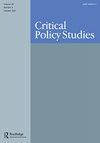Infrastructures, processes of insertion and the everyday: towards a new dialogue in critical policy studies
IF 2.4
3区 社会学
Q1 Social Sciences
引用次数: 0
Abstract
ABSTRACT This forum argues that the complex assemblages of infrastructures, and their reproduction in our everyday worlds, offer a privileged lens through which to explore the practices of much of what critical policy studies holds dear. It draws attention to processes of insertion that reproduce infrastructure in everyday lives, arguing that such processes cast new light on the work of the state, governance, and democratic struggles. It discerns three avenues as a means of exploring such infrastructural processes: first, an invitation to transcend the physical form and reflect on infrastructural temporalities; second on the transformation of spatial governance and policy through infrastructure; and third, a re-assessment in the relationship between infrastructures and the ‘modernist ideal’. Through these avenues, light can be shed on the often ‘hidden’ practices of policymaking. We conclude by calling for a dialogue across diverse disciplines, side-stepping embedded divides between academics-activists, cities-towns, and the global south-north.基础设施、插入过程和日常:在关键政策研究中走向新的对话
本论坛认为,基础设施的复杂组合及其在我们日常世界中的再生产,为探索许多关键政策研究所珍视的实践提供了一个特殊的视角。它引起了人们对日常生活中再现基础设施的插入过程的关注,认为这些过程为国家、治理和民主斗争的工作提供了新的视角。它识别了三种途径作为探索这种基础设施过程的手段:首先,邀请超越物理形式并反思基础设施的暂时性;二是基于基础设施的空间治理与政策转型;第三,重新评估基础设施与“现代主义理想”之间的关系。通过这些途径,人们可以了解决策过程中经常被“隐藏”的做法。最后,我们呼吁在不同学科之间进行对话,回避学者-活动家、城市-城镇和全球南北之间的根深蒂固的分歧。
本文章由计算机程序翻译,如有差异,请以英文原文为准。
求助全文
约1分钟内获得全文
求助全文

 求助内容:
求助内容: 应助结果提醒方式:
应助结果提醒方式:


